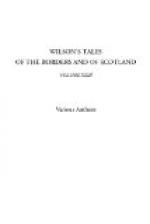The peasants to whose keeping George was confided, occupied, as has been stated, a small farm under his grandfather, which lay on the banks of the Dart, a few miles from Totnes. Their name was Prescot: they were cold-hearted and ignorant people; they had no children of their own, nor affection for those of others; neither had they received instructions to show any to him whom they were to adopt as a son; and if they had been arraigned for not doing so, they were of a character to have said with Shylock—“It is not in the bond.” When he grew up, there was then no school in that part of Devonshire to which they could have sent him, had they been inclined; but they were not inclined; though, if they had had the power to educate him, they could have referred again to their bond, and said that no injunction to educate him was mentioned there. His first ideas were a consciousness of cruelty and oppression. At seven years of age he was sent to herd a few sheep upon Dartmoor; before he was nine, he was placed as a parish apprentice to the owner of a tin mine, and buried from the light of heaven.
Often and anxiously Lieutenant Morris wrote from India, inquiring after his sons. He sent presents—love-gifts to each; but his letters were unheeded, his presents disregarded. His children grew up in ignorance of his existence, or of the existence of each other.
It was about eighteen years after the death of Maria, and what is called an annual Revel was held at Ashburton. Prizes were to be awarded to the best wrestlers, and hundreds were assembled from all parts of Devonshire to witness the sports of the day. Two companies of soldiers were stationed in the town at the time, and the officers, at the suggestion of a young ensign called Charles Sim, agreed to subscribe a purse of ten guineas towards the encouragement of the games. The young ensign was from Cumberland, where the science of wrestling is still a passion; and he, as the reader will have anticipated from the name he bore, was none other than one of the twin brothers. The games were skilfully and keenly contested; and a stripling from the neighbourhood of Totnes, amidst the shouts of the multitude, was declared the victor. The last he had overcome was a gigantic soldier, a native of Cumberland. When the young ensign beheld his champion overcome, his blood rose for the honour of his native county, and he regretted that he had not sustained it in his own person.
The purse subscribed by the officers was still to be wrestled for, and the stripling victor re-entered the ring to compete for it. On his design being perceived, others who wished to have contended for it drew back, and he stood in the ring alone, no one daring to come forward to compete with him. The umpire of the games was proclaiming that, if no one stood against him, the purse would be awarded to him who had already been pronounced the victor of the day, when Ensign Sim, who, with his brother officers, had witnessed the sports from the windows of an adjacent inn, said—




